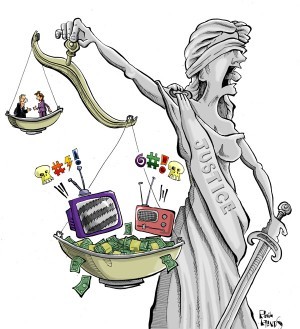Elsewhere we feature the second of two articles (thus far) on the matter of judges running for office in Shelby County. Just so you know, we’re not through with the subject. Not only will we continue to monitor the races for local judgeships as they develop — as well as the simultaneous retention elections for state Supreme Court justices — we will have more to say, too, about the whole matter of political interference with the judiciary, the one branch of government that should be free from politics.

Well, as free as possible. We’re not naive, and the whole idea of having your name on a public ballot at election time and hoping that people will vote for you — and asking for them to do so — is political. What we’re talking about is partisan politics — the kind that specifically serves the ends of special interests. We don’t use that phrase “special interests” pejoratively, just knowingly.
Corporations are one kind of special interest. Labor unions are another. Faith-based organizations are special interests. So are abortion-rights support groups. And so on. Nothing wrong with this. Our political system thrives on the play of special interests vis-a-vis each other — sometimes at odds, sometimes in common cause — through the structured processes of elections and government.
But judges are different. They have the same function regarding the civil and criminal aspects of society as referees do in sports. It is axiomatic that our founding fathers intended to create a political system with “checks and balances.” The ultimate check-and-balance is the independent judiciary. Judges don’t make the rules, but once the rules are made, judges enforce them. Without bias. That, in any case, is how it is supposed to be.
It is often said, apropos arguments against electing other local officials, that there is no Democratic way to issue deeds, no Republican way to organize court dockets, and so forth.
That goes double for members of the judiciary.
There are counties in Tennessee where judges run in party primaries for the right to compete in general elections. We don’t do that in Shelby County, but our two major political parties, Democratic and Republican, have taken to issuing endorsement slates in judges’ races, with little or no pretense to evaluating the legal credentials of the candidates they honor, but with the all-but-avowed (or even the openly avowed) purpose of getting party members or sympathizers onto the bench. With all due respect, we wish they’d butt out. And, with all due respect, the same goes for other quasi-political bodies, ethnic support groups, or what-have-you that cater, however well and ethically, to this or that self-interested corner of society.
Really, all we want in a judge is somebody who knows the law, understands how it applies in a given instance, and is fair-minded about doing so. Later this month, the Memphis Bar Association will be making public the evaluations made by its members, collectively, of this year’s crop of candidates for public office.
Now, those are judgments that might mean something.